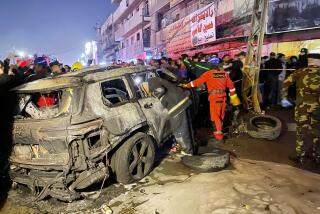Islamic State suicide bombers kill Iraqi soldiers at Jordanian border
Suicide car bombings by Islamic State militants at an Iraq-Jordan border crossing left at least five Iraqi soldiers dead Saturday and crippled the movement of trucks between the two Middle East nations.
Three attacks were carried out by suicide bombers from Senegal, Belgium and France on the Iraqi side of the Trebil border crossing, according to a statement from Islamic State in Iraq’s western Anbar province.
The militant group said 40 soldiers were killed in the checkpoint attack, about 300 miles west of Baghdad, and the Iraqi army headquarters there was destroyed. Images of the attack on social media showed plumes of smoke rising over a desolate collection of trailer trucks and buildings.
Iraqi government forces disputed that account, saying five soldiers were killed and 10 wounded, according to the Jordanian state news agency Petra.
Jordan’s Interior Ministry, in a statement released Saturday, said the attack “led to technical failures and stopped movement toward Jordan’s Al Karama border crossing,” less than two miles away.
The statement said the crossing was “still open and functioning as usual,” but an earlier version of the statement noted that commercial shipping had been “virtually nonexistent” for 11/2 years.
Iraqi satellite channel Sumariya News, meanwhile, reported that an Anbar provincial councilman implored the Iraqi government to intercede with Jordanian authorities to resume shipping.
“There are hundreds of Iraqi trucks stuck between the Trebil crossing and the Jordanian side that were prevented from entering the kingdom due to the closing of the crossing,” Farhan Mohammad said Saturday.
Jordan responded by mobilizing additional troops to its side of the border in what officials said was a “routine procedure” after such an attack, according to Jordanian media outlet Khaberni.
The violence marked the latest blow to Iraqi pro-government forces engaged in a large-scale offensive to counterattack Islamic State militants who seized much of Anbar province last year
Anbar province, a perennial battleground that was the site of fierce clashes between Sunni Muslim insurgents and U.S. forces during the 2003-11 U.S.-run occupation of Iraq, constitutes a third of the country. It is again the main stronghold for the Sunni insurgency battling what it views as a Shiite-dominated Iraqi central government.
Islamic State’s takeover of Anbar foreshadowed the fall of the northern city of Mosul in June after a stunning collapse of Iraqi army forces.
Islamic State’s subsequent rampage through a large section of Iraq prompted an intervention in September by a U.S.-led coalition to thwart the advance. It also led the Iraqi government to enlist thousands of Shiite irregulars in militias putatively under state control to bolster its embattled forces.
Known as the Popular Mobilization Units, they played a key role in the offensive last month to win back the city of Tikrit, north of Baghdad.
The Trebil border crossing attack came on the heels of the closure of the Nassib crossing between Syria and Jordan after Syrian rebels pushed out government troops stationed there.
Jordan, which has enjoyed an economic windfall from its position as a safe land route between Turkey, Lebanon and Syria to the Persian Gulf countries, is now faced with the prospect of only two functioning land crossings — to Saudi Arabia and Israel.
Bulos is a special correspondent.
More to Read
Start your day right
Sign up for Essential California for news, features and recommendations from the L.A. Times and beyond in your inbox six days a week.
You may occasionally receive promotional content from the Los Angeles Times.







